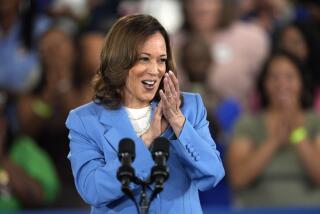Clinton faces new pressure on 2 fronts
- Share via
WASHINGTON — Hillary Rodham Clinton is coming under growing pressure from Democratic Party leaders and elected officials to quit the race, while some of her own supporters seem reluctant to rally behind her strategy for salvaging her presidential ambitions.
Intervening in the primary fight, Senate Majority Leader Harry Reid and House Speaker Nancy Pelosi are sending public and private messages to superdelegates urging them to make a choice once primary voting ends Tuesday.
The push, which began this week, is damaging to Clinton, whose fading candidacy would be best-served by prolonging the contest.
Clinton could use the time to press her case to superdelegates -- the elected officials and other insiders whose votes will decide the nominee -- that she is more electable than her front-running rival, Barack Obama. A delay also would improve the odds of a game-changing stumble by Obama.
The party’s leadership seems more intent on bringing the protracted nomination fight to an end, so that Democrats can pivot to the general election matchup with John McCain, who has been the presumed Republican nominee for months.
“We’re going to urge folks to make a decision quickly -- next week,” Reid said in an interview with a radio program in his state of Nevada. “We agree there won’t be a fight at the convention.”
Pelosi told the San Francisco Chronicle that if the nomination fight was not settled by the end of June, she would step in to resolve it.
The two top elected Democrats have been conferring with the party’s chief, Howard Dean, about how to close out the five-month nomination fight.
Clinton trails Obama by about 200 delegates, with just three primaries left: Puerto Rico on Sunday, South Dakota and Montana on Tuesday.
With her options running out, Clinton is hoping to revive her candidacy Saturday, when the party’s Rules and Bylaws Committee meets to resolve a dispute over whether to seat delegates from Florida and Michigan. But even some of her supporters seem dubious about the position she has staked out.
Clinton won both states’ contests in January. But because the states violated party rules by holding the elections too early in the campaign season, the results were nullified.
The New York senator wants the elections to count. Her position is that she should be awarded all of the delegates she would have gotten under ordinary circumstances.
Were that to happen, she would pick up as many as 111 more delegates in those states than Obama.
That would not overcome his lead, but it might narrow the gap enough that she could tell superdelegates the race was close enough to hand her the nomination.
Some in her campaign circle are not sold on the argument.
Given that Obama was not on the ballot in Michigan, a compromise needs to be worked out that would assure the Illinois senator a certain number of delegates, these people said.
Under Clinton’s plan, she would pick up 73 elected delegates in Michigan, and 55 would be assigned to “uncommitted.” Her campaign has given no hint that it is willing to bend.
Richard Schiffrin, a national finance co-chairman in the Clinton campaign, said a fair compromise might be splitting Michigan’s 128 elected delegates between the two candidates.
“I would support a compromise that is within a range of reasonableness,” Schiffrin said.
Alan Patricof, also a national finance chairman for Clinton, said that Obama couldn’t be the only one to sacrifice when Michigan and Florida delegates were meted out.
“Some accommodation has to be made to reflect what took place and so that both parties can walk away and feel justice prevailed,” Patricof said.
William Galston, a political analyst at the Brookings Institution and a former member of Bill Clinton’s White House staff, said: “There’s only one kind of outcome that really makes sense here. The rules have to be adhered to or else the whole thing turns into a farce. There must be some punishment. The minimum punishment is the reduction of weight of their delegations by 50%.”
Garry Shay, a member of the Rules and Bylaws Committee and a Clinton supporter, said it was important to impose a sanction so states wouldn’t leapfrog one another in the next presidential campaign. With no penalty, he said, “you’ll have absolute, total chaos in 2012.”
More bad news for Clinton came down from Democratic National Committee lawyers.
The party circulated a memo this week that said the rules call for Florida and Michigan’s voice at the nominating convention be cut at least in half. If the committee were to go along, Clinton’s potential gain in Florida, for example, might drop from 38 delegates to 19.
Within Clinton’s camp, aides are divided over how to proceed. Some want the fight to go on; others are ready for it to end.
A Clinton media spokesman, Phil Singer, said Thursday that after the final primaries next week, Clinton would remain a candidate, competing in what he called “the superdelegate primary.”
But others believe the end will come sooner.
One person with ties to the Clinton campaign said the senator might drop out as soon as Wednesday because it would become fruitless to lobby superdelegates.
“I’m not sure that having a cranky Pelosi and Dean saying, ‘Get out, get out,’ is an atmosphere conducive to making the argument” to superdelegates, said the person, who was not authorized to speak for the campaign.
--
janet.hook@latimes.com
More to Read
Sign up for Essential California
The most important California stories and recommendations in your inbox every morning.
You may occasionally receive promotional content from the Los Angeles Times.














